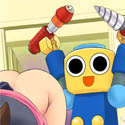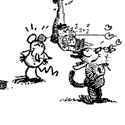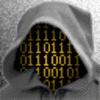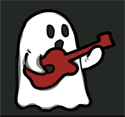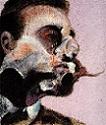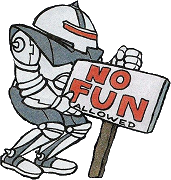|
Just finished Terry Eagleton's collection of lit-crit reviews titled Figures of Dissent (a retarded name as it has nothing to do with it). My review: quote:Terry Eagleton is best known as an, albeit unorthodox, Marxist writer on literary theory, so one could well expect a collection of some of his best literary reviews to be chock-full of impenetrable jargon. But looks can be deceiving: this collection, titled "Figures of Dissent", is in fact quite entertaining, even for those who have no particular training or interest in high-minded lit-crit. The title is somewhat odd, as the subjects under review have nothing in particular in common (except their works being published in English at some point), least of all some sort of status as 'dissenter'. The authors involved are on the other hand all interesting and varied, and this makes the book in fact rather a page-turner.
|
|
|
|
|

|
| # ? May 13, 2024 23:05 |
|
Just finished Stiff, and now I'm working on Neverwhere.
|
|
|
|
Finished T.C. Boyle's Drop City today. An entertaining book about a hippie commune and it's eventual move from California to Alaska, in which Boyle both recreates and dissects the 1970ies-Hippie idealism.
|
|
|
|
Finished A Farewell to Arms by Hemingway last night. It was my first experience of Hemingway, and I'm not sure how I feel about it at the moment. It wasn't really grabbing me until about halfway through, when I became a little bit more interested in what was going on. I'd heard it called one of the best anti-war novels, but it didn't really come across as terribly anti-war. I mean, obviously when his company has to retreat and he almost gets shot for desertion prompts him to get out of the army, but I felt like there was too much inane dialogue between him and his wife for most of the rest of the novel to distract me from any great anti-war point he was making. I might just be used to Steinbeck's more poetic descriptions, but there were only a couple of times in the course of reading the novel that I was struck by a nicely constructed sentence. I think I've heard that Hemingway's plain style is part of his appeal, but in AFTA at least, it didn't really grab my attention. Can anyone suggest what to read next of his, that might appeal to me more? Is A Farewell to Arms considered as one of his better works? I've got Green Hills of Africa and Across the RIver and Into the Trees, which I picked up cheaply ages ago.
|
|
|
|
Kapowski posted:Can anyone suggest what to read next of his, that might appeal to me more? Is A Farewell to Arms considered as one of his better works? I've got Green Hills of Africa and Across the RIver and Into the Trees, which I picked up cheaply ages ago. AFTA is definitely considered one of his better works. I have yet to read it, but hopefully I can help out. A lot of people have a very hard time with Hemingway. I had to try reading The Sun Also Rises several times before it "clicked." If you're looking to ease into him, I recommend his short stories. I've grown to really love Hemingway, but he's definitely someone you have to develop an appreciation for.
|
|
|
|
I finished Lolita. Easily one of the best novels I've ever read. Proof of the sheer power of the English language that one is. Now I'm working my way through Gravity's Rainbow by Thomas Pynchon. It's quite good, but so dense and complex and long that I estimate I'll finish it in...uh....2016, perhaps.
|
|
|
|
Negative Skunk posted:Now I'm working my way through Gravity's Rainbow by Thomas Pynchon. It's quite good, but so dense and complex and long that I estimate I'll finish it in...uh....2016, perhaps. Read it out loud, it helped me a whole bunch and prevents you from missing small-but-oh-so-important words Pynchon likes to throw in.
|
|
|
|
ranarium posted:A few hours ago I finished The Terror by Dan Simmons. I could not agree more. This book should have been called the Horrendous loving Boredom. It just kept going in circles of never ending torment for the reader.
|
|
|
|
Just finished Song of Solomon by Toni Morrison. I'd never read anything of hers before this, and the book was staggeringly powerful. Her use of language is incredible. Pilate's one of my favourite characters ever, from a book with best written, most rounded and real characters I've ever seen. While I was reading that, a friend emailed me 18 [badly scanned, but still readable] Black Library books, which were incredibly easy to read, not great but generally fairly enjoyable and diverting. Ravenor was probably the best of the bunch, the Caiphus Cain ones were oh so witty and amusing and I only managed about five pages into the first one and about two into the second one before I gave up because of the fact they were utter poo poo. All of the authors really, really want to be as good as Ian M. Banks, and slight lifts from the culture universe kept popping up ('Staberinde Street' in one novel, 'glanding' drugs in another, etc. etc.). Dan Abnett is the best of the writers, but that aint saying a huge amount - he just seems to keep focus on the story better than the others, rather than letting it drift. Still, they all rattled along fairly rapidly, and I finished them all in about five days, so no harm done.
|
|
|
|
I just finished "The Princess Bride", the good version edited by William Goldman. The book has to be one of my favourite fairy tales, and the way Goldman opens and closes the book with contexts surrounding him and the story is very entertaining and he also gives little tid bits of information that provide enlightment and break up the main story nicely. I would recommend it to anyone who fancies a good read. Here's hoping "Buttercups Baby" is on the way.
|
|
|
|
I just finished A Thousand Splendid Suns by Khaled Hosseini. I was very impressed with it, and loved it. Because it follows the struggles with power in Afganistan from the 1960s to the present, I learned alot about some heartbreaking history. It was a pretty moving book. I am going to read Hosseini's first book, The Kite Runner, as soon as it arrives in the mail.
|
|
|
|
Just finished Wicked by Gregory Maguire. A good revisionist take on the story of the Wicked Witch of the West. Certainly alters your sympathies if all you know of Oz prior to now if the movie.
|
|
|
|
Aki. posted:Here's hoping "Buttercups Baby" is on the way. ah the irony 
|
|
|
|
Sinclair Lewis's Babbit. It follows George Babbit, realtor in the newly all mechanized consumption obcessed 20's. He's a real dummy conformist, inspiring the word "babbitry." Other than some good reminders that todays social and political issues aren't horribly new, and that people have been materialistic consumer whores for some time, this book offered me nothing. I read it for an English class exploring the literary history of the American Dream and this book didn't really say anything other than "gorsh, money and houses don't make you happy, welp, better get back to it." RichBomb fucked around with this message at 02:08 on Jul 18, 2007 |
|
|
|
Finished Guns, Germs and Steel: The Fates of Human Societies. Excellent book with some fascinating insights into the possible reasons why history proceeded the way it did.
|
|
|
|
I just finished A Guide to Recognizing your Saints by Dito Montiel. Not a bad book, considering it really is just a stream of unlinked stories of random things that happened in the guy's life with little or no atttempt to establish a timeline or keep track of characters. I didn't think it was quite as clever as it tries to be but it was still a great little snapshot into the 80's rock scene in New York.
|
|
|
|
I just finished reading The Forever War, completing the list of Sci-Fi Future Armor books that I bought over the past month. The book is pretty good, but I found that non battle aspects of the novel where more fun to read then the fighting. Because of how space travel is presented, a month in travel would mean 5 years went past on Earth. Every time the hero would come back from a battle the Earth would end up aging something like 2 to 3 hundred years. I could not stop reading about how the Earth changed after each jump.
|
|
|
|
RichBomb posted:Sinclair Lewis's Babbit. Other than some good reminders that todays social and political issues aren't horribly new, and that people have been materialistic consumer whores for some time, this book offered me nothing. Then you should read what I just finished, It Can't Happen Here by the same author. It follows the 1936 election as religious extremists hijack the election and put into power a man who quickly becomes dictator. Quickly American life is thrown into the control of maniacs and is warped into a nazi-esque society. Parallels a lot of events going on in today's politics. The story revolves around a group of underground revolutionaries as they try to destroy the dictatorship. It was awesome and I LOVED this book. At the same time, this book kind of pissed me off. Before this I read Phillip Roth's Plot Against America which follows Charles Lindbergh's presidential election in 1940 and Lindbergh's nazi-esque regime. Roth's book is a steaming heap of festering poo poo. It also is a blatant ripoff of Lewis' book. It astounds me that Roth's book won the Sidewise award for alternative history when this story has already been written, only 219834235782623x better. I would constantly read passages in Lewis' story that mirrored exact situations in Roth's and it would piss me off because Lewis' story is so much better. Don't read Roth, read Lewis. And, RichBomb, it is much better than Babbit.
|
|
|
|
Encryptic posted:Finished Guns, Germs and Steel: The Fates of Human Societies. Excellent book with some fascinating insights into the possible reasons why history proceeded the way it did. How did you find the way it was written? I loved the book, and I pretty much agree with all his arguments, but I thought it came across like a PHD thesis: each chapter, he'd take his the central tenets of his argument and apply them to a different environment or culture or situation, which I thought was all well and good while he was still introducing new information, but got pretty tiresome by the last quarter where he just seemed to be repeating himself over and over again. I was almost skim-reading by that point until it reached the conclusions. I can't hold that too much against the book (he just seemed to be covering every possible avenue) but I just found got to be a bit of a slog.
|
|
|
|
RobertKerans posted:How did you find the way it was written? I loved the book, and I pretty much agree with all his arguments, but I thought it came across like a PHD thesis: each chapter, he'd take his the central tenets of his argument and apply them to a different environment or culture or situation, which I thought was all well and good while he was still introducing new information, but got pretty tiresome by the last quarter where he just seemed to be repeating himself over and over again. I was almost skim-reading by that point until it reached the conclusions. I can't hold that too much against the book (he just seemed to be covering every possible avenue) but I just found got to be a bit of a slog. Yeah, I found the last quarter of it got to be repetitive like you're saying. A ton of fascinating arguments in it and it's accessible to a layman like myself without being totally dumbed-down, nonetheless. I particularly found the theory of why the Spanish didn't get wiped out by Native American diseases to be very interesting in particular, as I'd often wondered about that before.
|
|
|
|
Finished Elfriede Jelinek's The Piano Teacher. Heard a little about Jelinek, mostly ranging from not-that-flattering to flat out hostile. Not sure where the hostility comes from though, since I enjoyed it just fine. As for the book itself, it lives or dies based more on the wildly unreliable narratives playing off each other more than any development plot-wise. Great terse style sustaining the tension, though there did seem to be stretches where the flow of ideas just piled up indiscriminately. Not so much that they weren't related, more as though she'd written a number of smaller sketches and jammed them all together. Sat on the shelf awhile before I got round to it, but more Jelinek actually seems a pretty intriguing prospect.
|
|
|
|
I just finished I, Lucifer Glenn Duncan. I enjoyed it while found some criticisms founded, like..."At times Duncan writes like an excited 14-year-old." But all-in-all it was a fun read. I am excited about the movie in 2008. Still undecided in next book.
|
|
|
|
Zen and the Art of Motorcycle Maintenance by Robert Pirsig - I finished it two days ago. I really enjoyed this book; it was a laid back philosophy text that wasn't very hard to read opposed to some dense Plato that I had read before. I'd like to read Lila eventually (it's much denser with the philosophy), but I'm now reading Walden by Thoreau. I recommend both  . .
|
|
|
|
The Three Musketeers by Alexandre Dumas. Not as good as The Count of Monte Cristo, but nontheless, loving awesome as usual, M. Dumas. Though, like my recent comments about Robinson Crusoe, I don't really see why this always on the Great Literature lists. It's a fantastic adventure story, but it doesn't really have anything deep or intellectual to say. It's just a really fun story. Completely 100% worth reading. Oh, and I know it was probably common at the time, but to a modern reader d'Artagnan comes off as fairly psychotic. I guess everyone was back then. But he challenged people to a death duel for pretty much looking at him funny. You know how that hot-headed friend of yours always starts trivial bar fights? Yeah, d'Artagnan does that with a sword.
|
|
|
|
Zero Karizma posted:The Three Musketeers by Alexandre Dumas. Not as good as The Count of Monte Cristo, but nontheless, loving awesome as usual, M. Dumas. Did you read an abridged version? I want to read this and reread Monte Cristo, but I don't know which way to go about it (like, whether the original is 1500 pages long like Les Miserables or which translation to get that isn't abridged).
|
|
|
|
inktvis posted:Sat on the shelf awhile before I got round to it, but more Jelinek actually seems a pretty intriguing prospect. wonderful wonderful times is excellent
|
|
|
|
Everything is Illuminated by Jonathan Safran Foer. I actually enjoyed the movie better; the parts with Alex and his creative use of English are the best, and some of the shtetl stories are quite good. Other attempts at magic realism fell flat for me, and I'm glad they left them out of the movie. The book is still quite enjoyable, but drags quite a bit during the parts that are supposed to be Jonathan's novel. It's well constructed and a quick read otherwise, with a few delightful characters who are worth your while. Next? Speaking with the Angel, a story collection edited by Nick Hornby.
|
|
|
|
Hermann Hesse's Siddhartha I was pleasantly surprised. Really uplifting, actually. Something for pretty much everyone here, as it encompasses nearly the whole range of human experience. Metaphorically, anyway. I'm now attempting Naked Lunch. Suggestions? Words of caution? Anyone plain loving hate it?
|
|
|
|
Can I just make it a point to say that I think the final Harry potter book should be exempt from this thread, until at least a month has passed. It's going to get mighty dull if the next week is everyone circle-jerking each other about it when there are 2 threads already. Just saying. Also I just finished Berserk Vol.1 By Kentaro Miura. Pretty cool, if a little threadbare plotwise, still for the first volume of a manga comic series it's certainly promising (I do say that however having already watched the Anime)
|
|
|
|
Finished Love In the Time of Cholera last night - amazing book. I really, really love the way Marquez writes - insightful, touching, and funny all in one book.
|
|
|
|
windwaker posted:Did you read an abridged version? I want to read this and reread Monte Cristo, but I don't know which way to go about it (like, whether the original is 1500 pages long like Les Miserables or which translation to get that isn't abridged). Nope, full. It's pretty long, but I read it on an ebook reader with smaller pages, so it's impossible for me to give you an accurate page estimate. Three Musketeers was very good, but a decent abridgement might be okay. Maybe. I dunno I'm not big on abridgements. For example, in Monte Cristo I'd always advise going with a full version, because the length makes it seem so epic.
|
|
|
|
Today I bought, started, and finished John Scalzi's Old Man's War. It was a good read, and I can definitely see where people draw comparisons to Heinlein's style (which I enjoy). The humor in it was kind of hit-and-miss, some of it was really funny, and some of it was painfully bad. He seems to try and make everything funny, which worked fine for Douglas Adams, but not so well in this case. To those who have read the other two books in the series, does that improve at all?
|
|
|
|
Mike Nelson's "Mind Over Matters". I can't express the crushing depression I felt that there were no more bite size hilarious essays for me to read before bed every night. Definitely going to get some more of his stuff, the guy is a comedy master.
|
|
|
|
|
Heller's Portrait of an Artist, as an old man. It's not even close to his best novels, but it's still a good book. It's very self refrential, with Heller talking about the authors that influenced him, and reflecting Heller's own life. It's Heller, though, so it's worth reading!
|
|
|
|
I just spent the reading the last three and a half hours Harry Potter book. I'm sure there will be a lot of bitching but I thought it was just about the perfect way to end the series. Two times I found myself choked up, and by the last page I was happy and sad that such a great series was done. Unlike most longer series i have read, this one actually satisfied. Hell, besides bad editing making the sixth book a little crappy this series managed to up the ante every book.
|
|
|
|
After the almost unanimous adoration of the goon mass made me buy it, I just finished Carl Sagan's The Demon-Haunted World. I found the first half of the work to be interesting, but I feel it lost focus and fell apart somewhat at the end, although his role near the end as a historian of Scientific progress was genuinely fascinating. My major complaint with the work comes with his almost laughable and arguably offensive summary and criticism of Post-Modernism. Considering how admirably and thoroughly he preaches analytic observation and open-mindedness, it seems upsetting to me that he appears to have spent no more than few passing seconds reading up on actual Postmodernist thought. The idea that he claims the argument "Darwin invented Evolution to further Atheism" as being from the Post-Modern movement is particulalry insulting to the school and wildly inaccurate. All in all, a very good read, but Sagan, like most scientific writers it seems, has a deep distrust of Postmodernism that leads him to strawman it and ignore it as an absurd enemy to rational thought as opposed to a valid intellectual school.
|
|
|
|
I just finished Replay by Ken Grimwood. It follows the lives of a man who at 43 dies of a heart attack. He wakes up suddenly in the year 1963 in his 18 year old body with all the memories of his life for the (next) 25 years. I just want to say how loving amazed I am at this story. I just spent 7 hours finishing the book. (I couldn't stop reading once Pamela was introduced to the story) What a beautifully tragic story. READ THIS BOOK.
|
|
|
|
This morning, I finished The Baseball Economist by J.C. Bradbury. Bradbury is the economist and statistician who coined the term Sabernomics, which looks at baseball stats from an economics standpoint. It is based on Sabermetrics, which is a more advanced form of baseball statistics. Combining these two, the book was amazing complex. I'm not an economist, but I do have a pretty great understanding of sabermetrics, so the book wasn't as difficult a book as it could have been. At the beginning, Bradbury says that the book is not for the lighthearted, and he was right on. Some of the parts of the book that I really enjoyed were when he gave a dollar value to players and teams, and noted which teams had been making the most money off of the players over the last few years. Instead of looking at which team was the best team, as in just looking at the records of the team, he looked at the teams as the businesses they are, which consisted of him determining how much value each player has and comparing it to the amount of money spent by the teams. He also examines myths in baseball such as "protecting" a hitter, or the effect of the sacrifice bunt and why giving up an out for a base is not always best. Overall, I really enjoyed this book. I do have an interest in economics, and I have always had an interest in baseball, so this book fueled both of my interests. I think I will be picking up more books that relate to this topic, but for now, it's time to read a relaxing, terrible, James Patterson book or another basic thriller. :/
|
|
|
|
Flim-Flam! by James Randi- Written in 1982 Randi is famous for debunking Uri Geller and this book does the same thing to lots of Paranormal events, UFOs, Psi, Remote Viewing and other bullshit. He offers a $10,000 (Now 1 million) prize to anybody that can prove him wrong and is more than happy to set the test up so the applicant is comfortable. Nobody has won it yet. I really like Randi, his debunking of Sir Conan-Doyle's fairie photos of the early 20th century is pretty through and uses a methodology that is effective.
|
|
|
|

|
| # ? May 13, 2024 23:05 |
|
I just finished The Temple of the Golden Pavilion by Yukio Mishima. It's a great book about this young Buddhist monk who is sent to study at a temple famous for its beauty. The temple fascinates the protagonist to the point of obsession. It's interlaced with alot of Zen Buddhist themes, and I wish that I had more of a background in Buddhism. It's excellent and I highly recommend it. I also just read The Portrait of Dorian Gray by Oscar Wilde. It's very will written, and it keeps you intrigued. Wilde has alot to say about art, youth and innocence. I think the book gives a great view of some of the seedier sides of Victorian society. The League of Extrodinary Gentlemen gives part of the twist away, but no one saw that terrible movie.
|
|
|








